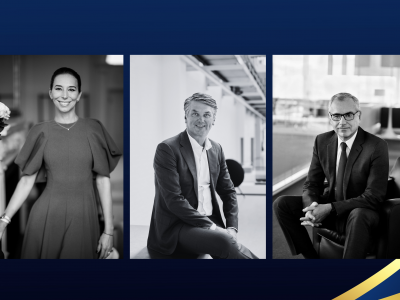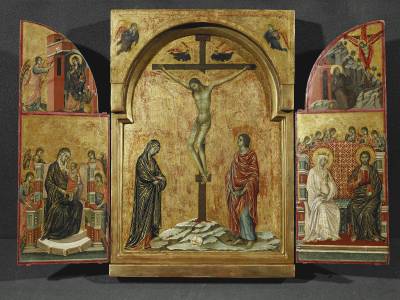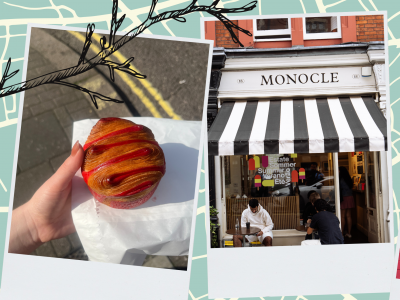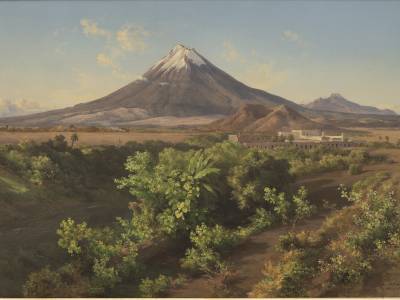This April, Saudi Arabia’s capital, Riyadh, is witnessing the rare spectacle of a fairy tale becoming reality. Once upon a time, in the 1970s, King Fahad ordered the construction of a building with a 3,000-seat auditorium, hoping that one day it might be a home for opera. Half a century later, his grandchildren are seeing his dream come to life in that very building, as the King Fahad Cultural Centre prepares to stage Zarqa al Yamama, the kingdom’s first ever grand opera.
Zarqa al Yamama - Saudi Arabia's First Grand Opera
13th March 2024
Zarqa al Yamama, Saudi Arabia’s first grand opera, is set to open at the King Fahad Cultural Centre, heralding a landmark moment for the country.
Presented by Zarqa al Yamama
Zarqa al Yamama represents a first for the kingdom in so many ways. Just seven years ago, it would have been unthinkable to stage an opera in Saudi Arabia — singing and playing musical instruments were banned in the 1920s and music continued to be perceived as decadent until Crown Prince Mohammed bin Salman started exploring the powerful, positive role of culture. Indeed, the decision to invest in such a ground-breaking project symbolises part of bin Salman’s determination to harness culture to open his kingdom up to global eyes as never before.

An astonishing £50 billion has already been invested in cultural projects (with plans for many more) including at AlUla, an ancient oasis city in Medina Province that represents a major part of the country’s drive to boost tourism. Culture is the hook with which to draw in millions of visitors annually, and the government’s aim is to raise the contribution of the travel and tourism industry to 10% of the country’s GDP by 2030.
Zarqa al Yamama is being produced as part of the kingdom’s goal to encourage collaboration between local and global creatives, to facilitate the exchange of skills. Sultan Al-Bazie is the CEO of the Ministry of Culture’s Theater and Performing Arts Commission, which is spearheading the project, and is well placed in the role, having worked as a cultural attaché in France and as editor-in-chief of the Saudi newspaper Al-Yaum. He also served as chairman of the Saudi Arabian Society for Culture and Arts between 2013 and 2017, where he elevated Saudi theatre to new levels.
This is why he’s now able to assert with confidence that the opera is vital and instrumental in reaching new audiences and exposing Saudi’s budding artistic community to diverse art and culture. “Staging Zarqa Al Yamama presents a landmark moment in the kingdom’s cultural journey,” he says. “It will inspire a new generation of Saudi artists and showcase Saudi Arabia’s culture to a global audience.”

The opera is based on an ancient tale from pre-Islamic Arabia and derives its name from the legendary blue-eyed woman of the Geddes tribe who possessed the gift of foresight. In the story, after foreseeing the approach of an army set on destroying her people, she desperately set outs to warn her leader and his advisors of the imminent danger.
The opera represents a truly global effort that has rarely, if ever, been seen in the cultural sphere before, bringing together exceptional talent from around the globe. The renowned, award-winning Saudi poet and playwright Saleh Zamanan wrote the libretto in Arabic. The Australian composer and record producer Lee Bradshaw, composer-in-residence at the St John’s Festival of Chamber Music in Melbourne, composed the score. Ivan Vukčević, Producer and Artistic Director of Arabian Opera, is from Montenegro, and is the artistic director of the Mediterranean Notes Music Festival in Tivat as well as the principal/solo viola with the Orchestra della Szizzera Italiana. Swiss-born stage director and producer Daniele Finzi Pasca is directing and the principal conductor is Spanish-born Pablo González, who has served multiple European orchestras. The orchestra itself is the award-winning Dresdner Sinfoniker, renowned as among the world’s leading ensembles for contemporary music. It will be accompanied by the Czech Philharmonic Choir of Brno with choirmaster Joel Hána.

The global reputations and calibre of the performers are equally astounding. The British critically acclaimed mezzo soprano Dame Sarah Connolly will play Zarqa in the title role. She will be joined on stage by bass Aleksandar Stefanoski, who plays Amliq, and baritone George von Bergen.
Other members of this star-studded cast include Italian-born soprano Serena Farnocchia, Australian-born soprano Amelia Wawrzon and Italian tenor Paride Cataldo. There are also three Saudi performers. Tenor Khayran Al-Zahrani is one of the first Saudi professional classical opera singers and was the very first to join the Coro Polifonico Musica Creator choir in Rome.
Soprano Sawsan Al Bahiti trained and performed on Broadway, and was the first woman to sing the Saudi national anthem publicly when she opened for La Scala di Milano’s Riyadh concert in 2019. She also established The Soulful Voice, the first official centre in Saudi Arabia to specialise in vocal coaching. The other Saudi soprano is Reemaz Oqbi, a prominent singer and flautist, and a well-known figure on the Saudi classical music scene in her role as manager of the Saudi National Orchestra and Choir.

Bringing together such diverse talent is no easy feat and Finzi Pasca likens the project to cooking a superb meal from a range of top ingredients. “When you go to the market you don’t always find exactly what you expect — you might find something that really surprises you,” he tells me. “But the market is a key moment to find everything you need — or maybe you need to change your idea a little bit depending on availability. In the global market, we have found exactly what we need on stage. We have all the best ingredients and the important thing now, as my grandmother always says, is to make sure we cook them all in the right way.”
I also speak with Bradshaw and Vukčević, whose joint excitement is evident as they watch the production finally come together after years of hard work. Both had originally balked at such a difficult undertaking and Bradshaw goes to great lengths to explain the complex process of having Zamanan’s poem translated into a libretto he could work with. “The original translation into English came to 86 pages,” he recalls. “It was huge, like the Ring Cycle, and I knew once back in Arabic this would involve even more words.” Despite all hurdles, Bradshaw and Vukčević saw this as an unprecedented opportunity to stage something completely extraordinary.
“For a start, the story is one of the most famous pre-Islamic legends in the entire world,” says Bradshaw. “Apparently even Shakespeare heard the story from Arabic sailors during his travels in the Mediterranean. What really impressed me is that at the story’s centre is a strong female character, while most of the male parts are archetypes of human flaws.” Having had the poem cut and translated back into Arabic, Bradshaw had every single line recorded by an Arabic speaker and sent to his team in Australia to be phoneticised. From there he did a rhythmic dictation and began working on the score in earnest.
“There’s so much rhythm, music and beauty in the language,” he enthuses. “On top of that we’re using an art form, deeply entrenched in Western culture, to tell this famous Arabic story in their own language. Marrying those things together is actually genius. And even the concept of bridging two cultures with music is genius, because at the end of the day, music is the only truly international language.”
Mention the idea of culture washing and Bradshaw and Vukčević resolutely insist that the opera will benefit the Saudi population at large. “Once the general population sees the calibre of artists on stage, it will undoubtedly awaken interest among the younger population to study music,” Vukčević says. “It behoved us to demonstrate what was possible at the very highest level, because if you’re going to initiate a tradition and encourage a culture that’s never been seen before, you need to show the absolute best. If you were introducing tennis to a place that’s never played it, wouldn’t you take Nadal, Federer and Djokovic?”
And should anyone cynically scoff at any international artist’s integrity in choosing to take part in this endeavour, Vukčević and Bradshaw point out that no one on the production has worked for more than the international standard rate. Connolly insists that it is certainly not just Riyadh reaping all the benefits. “Even if there are some political advantages for them, we Westerners are getting something out of these extraordinary events,” she says. “I’m relishing the challenge of singing an opera about a Saudi heroine in classic Arabic. Who says it’s one-sided?”
Vukčević compares the enterprise with the great American violinist Isaac Stern’s 1979 tour of mainland China. From Mao to Mozart: Isaac Stern in China, the 1980 Academy Award-winning documentary about Stern’s concert in Beijing, was broadcast internationally. “Today China produces superb musicians and some of the finest violin soloists in the world, all springing from Stern’s visit,” says Vukčević. The visit was a joyful musical introduction for the Chinese people, he observes. “This proves how transcendent music can be. China was accused of culture-washing back then, but music belongs to everyone and will always be a winning force, connecting cultures and breaking down barriers.”
“We need to take art to places that it hasn’t been before,” adds Sultan Al-Bazie. “It’s about putting the infrastructure in place to give people the hope of following a creative path, which is what we’re really trying to achieve with this project.”
For further information, including details on how to book, visit this link

